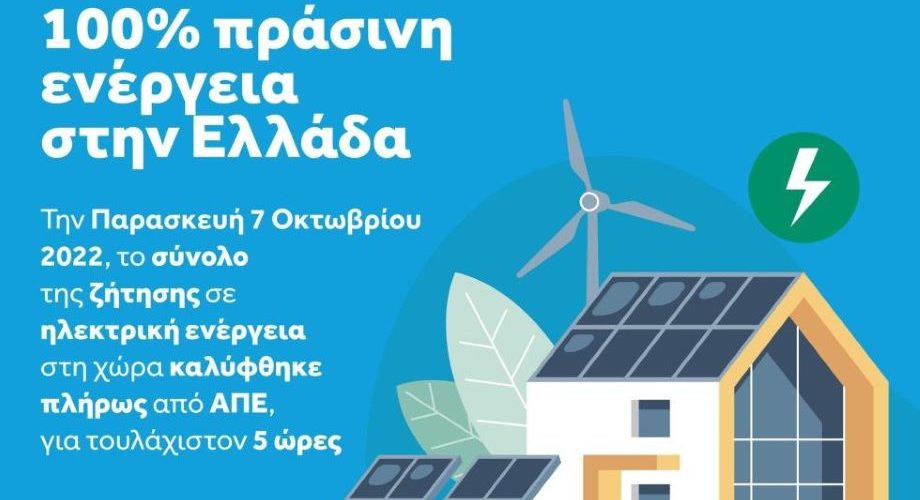Nikos Mantzaris spoke to Skynews journalist Shaheena Uddin about renewables milestone in Greece on October 7, 2022.
According to Mantzaris, covering 100% of the country’s electricity demand from renewables for 5 hours on Friday October 7 is undoubtedly a significant milestone, which was considered impossible by many opinion and decision makers a few years back.
There are still many obstacles before Greece fully exploits its rich renewables potential, such as the lack of grid availability, electricity storage infrastructure and an adequate spatial plan for the proper sitting of renewables. However, none of these are insurmountable. Thus, whether the shift to renewables in Greece will accelerate or not, depends on the political will to resist pressures to develop fossil gas infrastructure instead.
The article was published on October 14, 2022. You can read the full article, including comments by the UK-based think tank Ember below:
For five hours last week Greece ran entirely on electricity from solar, wind and water
Greece breaks a new record by running the country entirely on renewable energy for five hours
Greece ran entirely on renewable energy for five hours last Friday for the first time ever – using solar, wind and hydroelectric power.
It reached a record high of 3,106MWh (megawatt hours) of electricity at 9am local time (7am UK time), according to IPTO, the country’s independent power transmission operator.
IPTO said: “For the first time in the history of the Greek electricity system, the demand was covered 100% from renewable energy sources.”
Greece aims to more than double its green energy capacity as it hopes renewables will account for at least 70% of its energy mix by 2030.
Tilos, part of the Dodecanese group of islands, is also working towards running entirely on renewable energy under a €30bn (£26bn) project funded by the EU and private investment.
100% renewable electricity system within reach
Nikos Mantzaris, a partner at think tank the Green Tank said last Friday’s performance was important because “it shows that a 100% renewable electricity system is within reach in Greece, a concept that was considered impossible by most opinion and decision makers in Greece before”.
“The road for the deployment of renewables in Greece during the last decade has been bumpy with many hurdles and periods of stagnation. An electricity system with increasing shares of renewables is technically feasible if it is supported by energy storage technologies and adequate grids.”
“It is also economically preferable by far compared to electricity produced by lignite or gas, even if one includes the cost of storage,” Mr Mantzaris said.
Problems not insurmountable
He added: “The bottlenecks for further development of renewables are grid capacity, lack of adequate energy storage capacity and lack of an appropriate spatial plan for the proper siting of renewables.
“Since none of these problems are insurmountable, it all boils down to political will and the resolve of the Greek government to resist intense pressure for the development of new fossil gas infrastructure, instead of scaling up the shift to renewables.”
Renewables-dominated electricity grid is within sight
According to electricity data from Ember, an independent think tank, Greece generated 39.4% of its electricity from renewables last year, including 19.8% from wind, 9.9% from hydro and 8.9% from solar.
It generated 61% of its electricity from fossil fuels in 2021, including 40.6% gas and 11.3% coal.
In 2012, 51.2% came from goal, 22% from gas, 7% from hydro, 6% wind and 2% solar.
Ember’s 2030 Renewables Target tracker says Greece is targeting 70% renewable electricity for the whole year by 2030. Portugal is aiming for 100%, Netherlands 97% and Germany 80%.
Elisabeth Cremona, an analyst at Ember, said: “The milestone reached by Greece proves that a renewables-dominated electricity grid is within sight.
“This also clearly demonstrates that the electricity system can be powered by renewables without compromising reliability. But there remains more to do to ensure that renewables overtake fossil fuels in Greece’s power sector across the whole year.”



















































































































































































































































































































